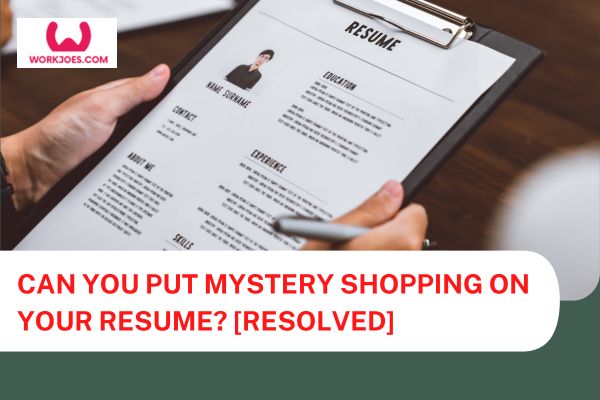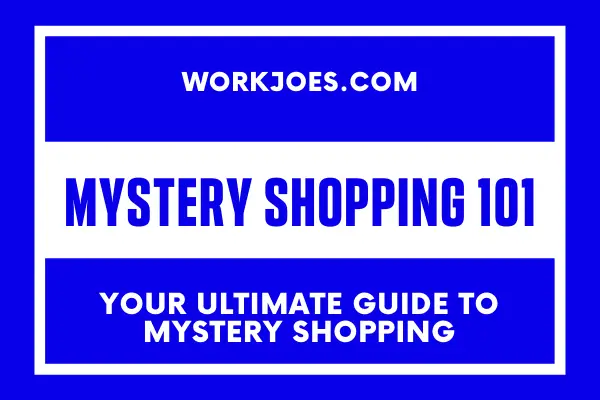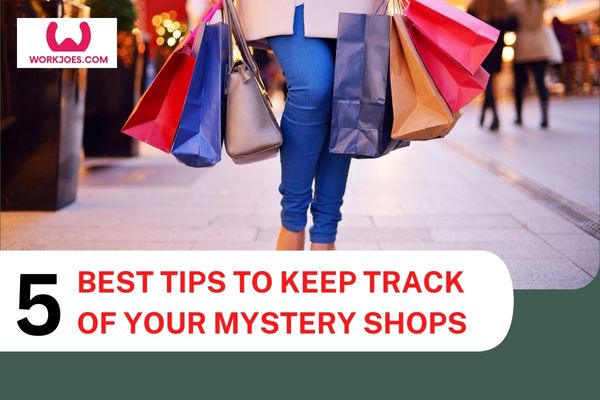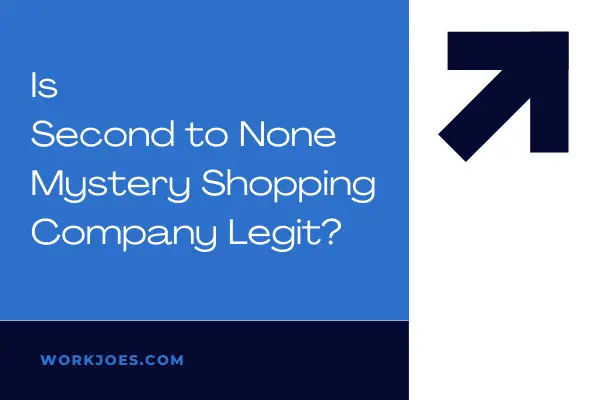Mystery shopping is a simple side gig or hustle for many. It is a part-time job for many. But many forget to consider that it, holds untapped potential when it comes to skill development and professional evaluation. But can such an experience find its rightful place on a resume?
If you are looking for answers on whether to put your mystery shopping experience on your resume or not. Then let’s explore.
Mystery Shopping On Your Resume
Absolutely! Mystery shopping is a legitimate form of market research. Many businesses rely on it to assess their employees’ performance and the overall customer experience. Including it on your resume can highlight a range of valuable skills, depending on how you present it.
Before we jump onto the skills section let’s do a quick round-up about the process of Mystery shopping.
Understanding Mystery Shopping
Mystery shopping is a method used primarily by market researchers to gauge the quality of service, and compliance with regulations. It also gathers specific information about products and services. Businesses value this covert evaluation as it provides unbiased insights into the customer experience. It allows them to refine their operations and improve overall customer experience.
Here’s how and why:
The Value of Mystery Shopping Skills
Mystery shoppers cultivate a diverse range of skills:
Customer Service Assessment:
Mystery shopping primarily evaluates customer service. You can show potential employers that you have an eye for detail and an understanding of what makes exceptional customer service.
This can be valuable for roles in sales, marketing, or in customer service.

Reporting and Feedback:
After every mystery shopping task, you make a detailed report of your feedback. This means you have skills in observation, reporting, and quantitative assessment.
These skills can be valuable in roles that require attention to detail, such as data analysis, project management, or quality assurance.
Integrity and Discretion:
As a mystery shopper, you need to operate with a degree of secrecy. By successfully doing so, you prove your integrity and ability to handle sensitive information. It makes you a trustworthy candidate for positions that handle confidential data or tasks.
Adaptability:
Each mystery shopping assignment requires you to adapt to a new scenario or assume a different persona. This adaptability can be a testament to your versatility and ability to take on diverse roles or challenges in the workplace
How to Include Mystery Shopping on Your Resume
Position Title:
Instead of just listing “Mystery Shopper,” consider titles like “Customer Service Evaluator” or “Market Research Analyst” to give it a more professional touch.
Description:
Be specific about your responsibilities. For example: “Conducted 50+ evaluations of retail stores to assess customer service quality, product placement, and store cleanliness. Provided detailed reports which contributed to an x% improvement in customer satisfaction scores.”
Skills Highlighted:
Under the skills or qualifications section, mention the relevant abilities you’ve honed, such as “Detail-oriented reporting,” “Data analysis,” or “Customer service assessment.”
Various Job Roles for Mystery shoppers (Don’t Miss the last one)
Mystery shopping provides a unique set of experiences and skills that are helpful for various job and career opportunities. Here’s a breakdown of potential job/career paths for someone involved in mystery shopping:
1. Market Research Analyst:
Mystery shoppers gather detailed insights about businesses from a customer’s perspective. This understanding can be valuable for a career in market research, where collecting, analyzing, and interpreting market data to recommend strategies is key.
2. Customer Experience (CX) Specialist:
Many companies prioritize improving the customer journey. With a background in mystery shopping, an individual would have firsthand knowledge of what customers look for. It makes them invaluable in customer experience roles.
3. Quality Assurance (QA) Inspector:
Just as mystery shoppers evaluate the quality of service, QA inspectors assess the quality of products or services in various industries. The observational and evaluative skills acquired in mystery shopping can be directly applicable here.
4. Training and Development:
Companies often seek experts to train their staff to deliver better customer service. Mystery shoppers, having assessed numerous service standards, can transition into roles that develop training programs or conduct workshops.
5. Retail Management:
Mystery shopping often involves evaluating retail environments. This experience provides insights into retail operations, making mystery shoppers potential candidates for managerial positions in retail.
6. Auditor for Compliance:
Certain industries have strict guidelines and standards for operation. Mystery shoppers can use their observational skills in roles that audit businesses for compliance with industry or governmental regulations.
7. Sales and Marketing:
Understanding the customer’s viewpoint and the factors that affect their purchasing decisions can be an advantage in sales and marketing roles. It helps in crafting persuasive strategies.
8. Consulting:
With a broad understanding of customer service standards across various industries, mystery shoppers can branch out into consulting roles, helping businesses improve their service standards.
9. Brand Ambassador/Influencer:
Having evaluated multiple brands, mystery shoppers can leverage their insights and understanding of brand reputations to become brand ambassadors or influencers. Especially in sectors they’re particularly passionate about.
10. Franchise Examiner:
If someone has evaluated numerous outlets of a specific franchise, they can specialize in providing feedback to franchisees. It will ensure the standardization of products and services across all locations.
11. Freelance Writer/Reviewer:
Mystery shoppers provide detailed written feedback. They can transition this skill into a career in writing, particularly focusing on reviews, blogs, or articles related to customer experiences, services, or products.
12. Get Hired By Mystery Shopping Companies
Recently I was watching a webinar on Youtube about Mystery Shopping as a side hustle. It featured Diana Paone, she is the senior accounts manager at IPSOS. Ipsos is a very reputable mystery shopping company operating worldwide.
The surprising thing was that Diana started her career as a Mystery shopper. She was evaluating a no of mystery shopping companies including Ipsos. Later in her career, she got an offer to join Ipsos. She started as a shop scheduler, whose responsibility was to schedule shops in coordination with evaluators. Now she is in a Senior position with the company.
The gist of it is that if you will do well, and build a reputation for yourself as a mystery shopper then you have all the chances to get hired by different companies.
A good mystery shopper is one who performs all evaluations on time, reports back on time, and takes all instructions seriously.
This is not the only instance if you scan all the mystery shopping companies then you will find many such examples.
You can take inspiration from this webinar recording on YouTube.
Conclusion
Mystery shopping can be more than just a side gig. It’s an opportunity to develop and showcase essential professional skills. When presented correctly on a resume, it can position you as a versatile, observant, and trustworthy candidate for a range of roles.
By focusing on the skills and insights gained from it, you can provide a fresh perspective to your potential employers. So, don’t shy away from including it, just make sure you frame it in the best light.







